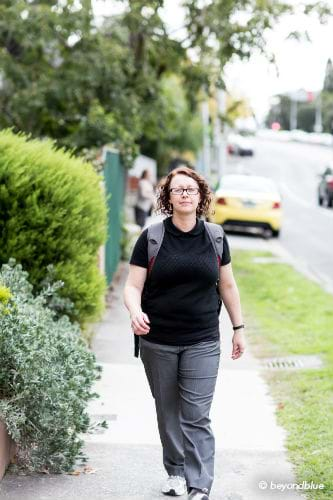TAKING CARE OF YOURSELF: LIFESTYLE
Eating healthily, exercising regularly, getting enough sleep and avoiding harmful levels of alcohol and other drugs can help you keep your mental health on track, manage symptoms of depression and anxiety, and improve your overall wellbeing.
Exercise
We all know that exercise is one of the most important things we can do for our health and wellbeing, but sometimes even with the best of intentions, exercise often slips to the bottom of the list.
Exercise has not only been shown to be effective in treating mild to moderate depression and anxiety, it is a proven method for combating stress.
Exercise isn’t just going to the gym or going for a run. There are many ways to become more active; alone or with others.
It can also be a great way to meet new people and help make social connections – another valuable way to help maintain good mental health.
"If I've had a terrible day at work where nothing has gone right and everything has gone wrong, I'll go home and go for a run or a bike ride to clear the head."
Scott
Relaxation
There are many types of relaxation techniques. Simple breathing exercises are easy to do while progressive muscle relaxation, visualisation, meditation, mindfulness and gentle physical activities can also help you manage your stress levels.
Just putting away electronic devices for a set amount of time to get away from the outside world and any pressures or demands, or spending time with family or friends are great ways to relax.
Spend some time thinking about the positive things that help you to relax. It may be useful to make a list of what works for you so you have it on hand when you need it.
Keep fit
- Go for a walk or bike ride
- Go bush walking
- Go swimming
- Do Yoga/Tai Chi
- Go to the gym
- Get good quality sleep (see below)
Entertain yourself
- Read a book or magazine
- Write a letter/email
- Play a solo card game
- Do a crossword/Sudoku
- Visit a museum/art gallery/library
- Go to a market
Around the house
- Cook something new
- Listen to music/the radio
- Play in the backyard with your
children or pets - Do some gardening
Pamper yourself
- Have a bubble bath
- Buy some flowers
- Lie on the beach and read a book
- Get a massage
Sleep
Sleep is crucial to our quality of life. Poor sleep– or sleep deprivation – can impact our health and immune systems and can substantially affect our productivity and safety.
There are a number of practical strategies for improving sleep habits:
- Reduce or eliminate caffiene, nicotine and alcohol
- Stick to a regular sleep pattern – even on the weekend
- Cut out naps, which can interfere with your quality of sleep
- Exercise, particularly early in the day
- Ensure you have a comfortable sleeping environment
- Ensure the temperature in the bedroom isn't too warm – cool conditions
help you get to and stay asleep - No phones, TVs, work or laptops in the bedroom
- Try to relax and slow down at least 30 minutes before going to bed.
- Give your body time to relax and prepare for sleep
- Look for ways to lessen the impact of shiftwork on your quality and
quantity of sleep.
There are apps available that might assist with improving your sleep.
Source: Heads Up


